07/14/21
K-State Current - July 14, 2021
K-State Current is a weekly news update for the Kansas Board of Regents to apprise the Regents on a few of the many successes and achievements made by K-State faculty, staff and students.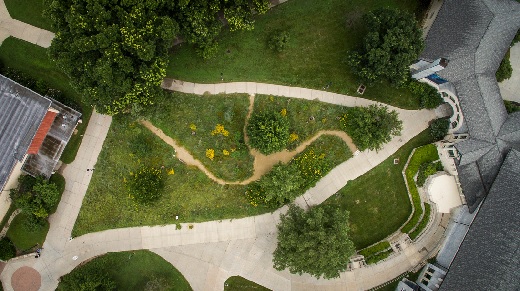
K-State News
One-year master's program provides path for professional biomedical studies
Kansas State University continues to fulfill its land-grant mission through new programs that help serve unique educational needs.
Launched in summer 2020, the new one-year master's degree in biomedical science program is attracting a broad mix of students to the College of Veterinary Medicine, serving as a bridge for opportunities both inside and outside of the veterinary medical curriculum. Part of the appeal lies in the program only requiring a yearlong commitment for completion of a master's degree.
"Often students are not sure what their future holds," said Matthew Basel, clinical assistant professor and associate director of the program. "The pre-professional one-year master's program is designed to introduce students to the biomedical field and prepare them for professional school. During the program, students are able to take advanced courses in a wide range of biomedical sciences, including anatomy, physiology, histology and pharmacology."
"This program has been a great way to strengthen my application for dental school," said Julissa Andazola, who is in the program's first class of students. "I have been able to improve my grade point average while working on rigorous coursework."
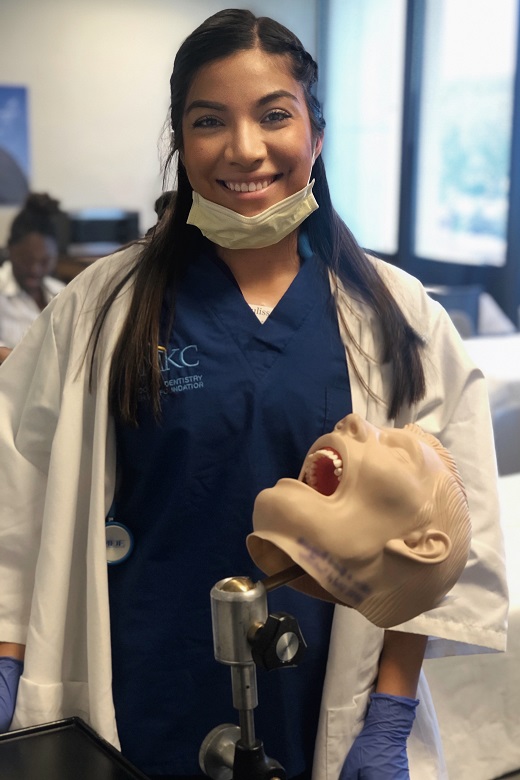 Andazola, Ingalls, has a bachelor's in life sciences from K-State.
Andazola, Ingalls, has a bachelor's in life sciences from K-State.
"I applied for the one-year master's program to strengthen my application for veterinary school and gain the confidence I needed to successfully enter a professional program," said Elizabeth Grimes, another student in the program. Grimes, from Cypress, Texas, came to K-State for the program after earning her bachelor's degree at another university.
Hosted in the anatomy and physiology department, the pre-professional one-year master's program in biomedical science is a non-thesis, coursework-based master's degree that can be completed in 12 months. Typically a master's degree program takes about two years to complete. This program starts during the summer session and is completed at the end of the following spring semester. The 2021 program starts June 7. Applications for summer admission are being accepted through Friday, May 21.
Along with Basel, program coordinators include Pradeep Malreddy and Cathy K. Sparks, clinical assistant professors who both teach anatomy courses in the veterinary college.
"There are no specific admission requirements for this program, as we would like to serve a wide range of potential students," Malreddy said. "We do have some suggested guidelines for students that we think will help them be more likely to succeed. We recommend a bachelor's degree in a biomedical science-related field, a minimum 2.5 or higher overall grade point average and at least a 2.8 grade point average in their higher-level science courses or the last 45 hours of bachelor's degree studies."
All students earning a master's degree at Kansas State University must complete a culminating experience that will be determined by the student in concert with his or her graduate committee. Culminating experiences include either an intellectually creative project, a final report or a culminating examination.
"We believe the best place to prepare for professional school is at a professional school where students can interact with professors who understand the program," Basel said. "Students take courses designed to have the same rigor as any other professional health school and have access to world-class facilities. Classes begin in the summer semester with an intensive introduction to anatomy and physiology, followed by a mix of required and elective courses in the fall and spring."
While the first class nears graduation in May, the program is currently taking applications for the next school year. Classes are scheduled to start in June. Applications are made through the Graduate School at Kansas State University, while the one-year master's program in biomedical science is administered through the College of Veterinary Medicine.
For a full description of the program, the admission requirements and application procedures, go to vet.k-state.edu/education/graduate/one-year-masters/admissions.html.
K-State's Johnson Cancer Research Center awards nearly $416,000 for cancer research and education
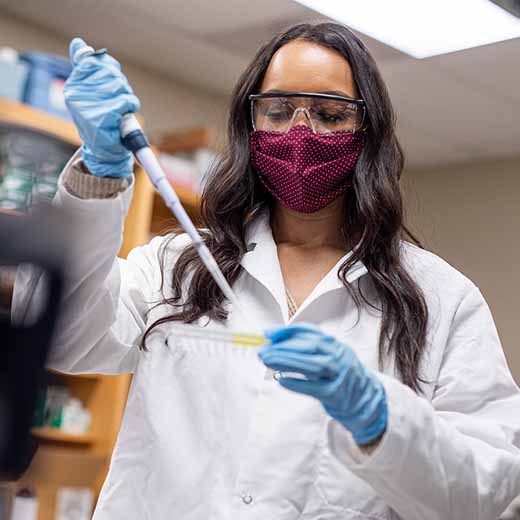 Thanks to its supporters, the Johnson Cancer Research Center at Kansas State University was able to direct $415,939 to cancer research and education programs and students this past year.
Thanks to its supporters, the Johnson Cancer Research Center at Kansas State University was able to direct $415,939 to cancer research and education programs and students this past year.
"The clinical treatments that save lives start with basic cancer research, but this initial step is expensive," said Sherry Fleming, director of the Johnson Cancer Research Center and professor of biology. "Unlike clinical providers who charge fees for their work, researchers must constantly seek grant funds and philanthropic support for theirs."
Private donations to the center provide hundreds of thousands of dollars a year for innovative cancer research, laboratory equipment, support of student researchers, and more. Information about all the awards is on the center's website at cancer.k-state.edu/awards/.
In academic year 2020-2021, the center awarded $95,500 in faculty Innovative Research Awards for studies in such areas as safer drug delivery methods, lab-on-a-chip cancer detection technology, and new chemical tools for cancer drug discovery. It also awarded $150,439 in undergraduate and graduate student Cancer Research Awards. Additionally, $50,000 was awarded to establish the multidisciplinary Cancer Research Collaboration of Excellence in Tumor Microenvironment.
The center also facilitated two major directed gifts. The Flossie West Trust provided $100,000 for breast cancer immunotherapy research. Two Linders Family Cancer Expansion Awards totaling $20,000 were awarded to help faculty members expand the cancer focus of their research programs.
"We are grateful for the many friends whose donations fund K-State's most promising cancer research programs and student trainees," Fleming said. "These gifts, large and small, make a big difference, and frequently help obtain sizeable extramural grants."
"K-State has broad strengths in basic research in fields including cell and molecular biology, immunology, virology and nanotechnology that have been foundational for breakthroughs in cancer research by our scientists," said Beth Montelone, K-State senior associate vice president for research.
The Johnson Cancer Research Center has nearly 90 faculty members conducting multidisciplinary cancer research in 20 departments at Kansas State University. Its programs depend on private donations. More information about the center is at cancer.k-state.edu.
K-State Faculty Highlights
Rahmani awarded USDA grant to improve estimation of evapotranspiration
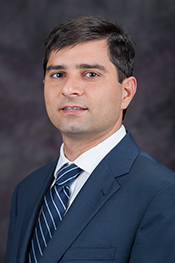 Vahid Rahmani, assistant professor in the Carl and Melinda Helwig Department of Biological and Agricultural Engineering at Kansas State University, has received a U.S. Department of Agriculture — Research Education and Economics grant to improve evapotranspiration and soil moisture information across the U.S.
Vahid Rahmani, assistant professor in the Carl and Melinda Helwig Department of Biological and Agricultural Engineering at Kansas State University, has received a U.S. Department of Agriculture — Research Education and Economics grant to improve evapotranspiration and soil moisture information across the U.S.
Rahmani is the K-State lead on the nearly $500,000 three-year project with Steven Quiring, professor and the lead at Ohio State University. Operating under the USDA National Institute of Food and Agriculture program, the pair will partner in conducting research on "Leveraging Machine Learning to High-Resolution Soil Moisture and Evapotranspiration Data to Support Farm-Scale Decision Making."
This project addresses the critical need to enhance accuracy and utility of national evapotranspiration and soil moisture products by integrating new data sources and downscaling them to farm-scale.
"We will apply state-of-the-art artificial intelligence and machine learning techniques using a wide range of observed and remote sensing information," Rahmani said. "Our efforts will contribute to advancing algorithms used for estimating evapotranspiration and soil moisture with higher spatial and temporal resolution for the contiguous United States."
The expected end result will be an operational cloud-based software system that will generate national-scale, daily gridded products using the latest available data.
"With its broad scope, this project will contribute to the recognition of research excellence at both K-State and the Carl R. Ice College of Engineering," Rahmani said. "Undergraduate and graduate students will be trained with the latest techniques in tackling these critical engineering and agricultural issues."
K-State Student News
2021 APDesign graduate wins ARCC/King Student Medal for Excellence
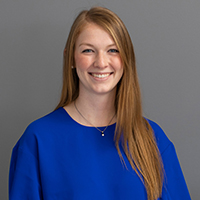 Each year, one outstanding graduating student from the Kansas State University College of Architecture, Planning & Design receives the ARCC King Medal. The 2021 recipient is Abbey Hebbert, Liberal, graduate in regional & community planning.
Each year, one outstanding graduating student from the Kansas State University College of Architecture, Planning & Design receives the ARCC King Medal. The 2021 recipient is Abbey Hebbert, Liberal, graduate in regional & community planning.
The Architectural Research Centers Consortium, or ARCC , offers this award in honor of the late Johnathan King, a co-founder and first president of the organization; each member college is privileged to give this award annually to a student in recognition of research excellence in architecture and environmental design.
Graduating students may be nominated by their major professors and each department follows its own process for selecting nominees. In addition to Hebbert, three graduating students were nominated:
- Robyn Fritze, Andover, graduate student in interior architecture & industrial design, for her work, "An Evidence-Based Approach to Designing Mentally Restorative Higher Education Environments."
- Julie Kappelman, Olathe, graduate student in landscape architecture, for her work, "Start now, activate places: a guide to transforming public space with community-led event programs."
- Alexandra Mesias, Lee's Summit, Missouri, graduate student in architecture, for her work "Assessing architecture students' 'in the moment creativity' and emotive response during design tasks."
The nominees' research materials were evaluated by a jury of researchers from across the university.
In describing Hebbert's research on "Renewed Purpose: Exploring adaptive reuse for quality, affordable housing in Kansas City, Kansas," her major professor, Susmita Rishi notes, "Through this work, Hebbert makes important, original contributions to the scholarship on quality and affordable housing and highlights the opportunities that adaptive reuse of existing buildings provides for the same."
The jury included the following comments: "Hebbert's project has a clear goal, an appropriate research design to answer the research questions, and keeps a clear focus throughout." Jurors also noted the high quality of all nominee's projects, "They all addressed important societal issues in innovative ways."
More information about the King Medal is available at arcc-arch.org/king-student-medal/.
Collegian Media Group again sweeps top honors in state contest; students earn 53 individual awards
 The Collegian newspaper, Royal Purple yearbook and Manhappenin' magazine, combined, won 53 individual awards at this year's Kansas Collegiate Media conference on Friday, April 9. The publications also swept the three All-Kansas categories for Best Newspaper, Best Yearbook and Best Magazine. It's the second consecutive year that Collegian Media Group, or CMG, took the top spot in every category.
The Collegian newspaper, Royal Purple yearbook and Manhappenin' magazine, combined, won 53 individual awards at this year's Kansas Collegiate Media conference on Friday, April 9. The publications also swept the three All-Kansas categories for Best Newspaper, Best Yearbook and Best Magazine. It's the second consecutive year that Collegian Media Group, or CMG, took the top spot in every category.
Hundreds of students across the state competed in at least 30 categories, including Journalist of The Year in which The Collegian's editor-in-chief Bailey Britton, won second place. Manhappenin' magazine writer Anna Schmidt, won first place for Profile Writing. Kate Torline won five awards in multiple categories for her work with the magazine and the Royal Purple, including a first-place win for Portrait Photography.
"These well-deserved recognitions are a testament to the hard work and dedication of our students who have worked tirelessly to tell the important stories of our campus community," said John Walter, Collegian Media Group assistant director. "Despite the challenges and obstacles of this past year, these students have worked hard to find creative solutions without ever missing a step and I couldn't be more proud of their efforts."
"The editorial accomplishments can't happen without financial resources," said Ira David Levy, Director of the Collegian Media Group. "We owe much of this success to the outstanding work of our advertising sales team."
Led by Daren Lee Lewis, director of advertising sales and marketing, the Collegian Media Group's advertising department won first place for Best Rate Card and three awards for Best Single Ad Design.
"More important than the awards," Levy said, "is what they do for our students. They reflect and serve as evidence of a strong work ethic, experience, and skills that future employers look for when choosing from among thousands of college graduates competing for their first jobs. The students who work at CMG are building their foundations and portfolios that they will bring into interviews. Many of our students are not journalism majors and I invite students across campus to join the team and aspire to achieve."